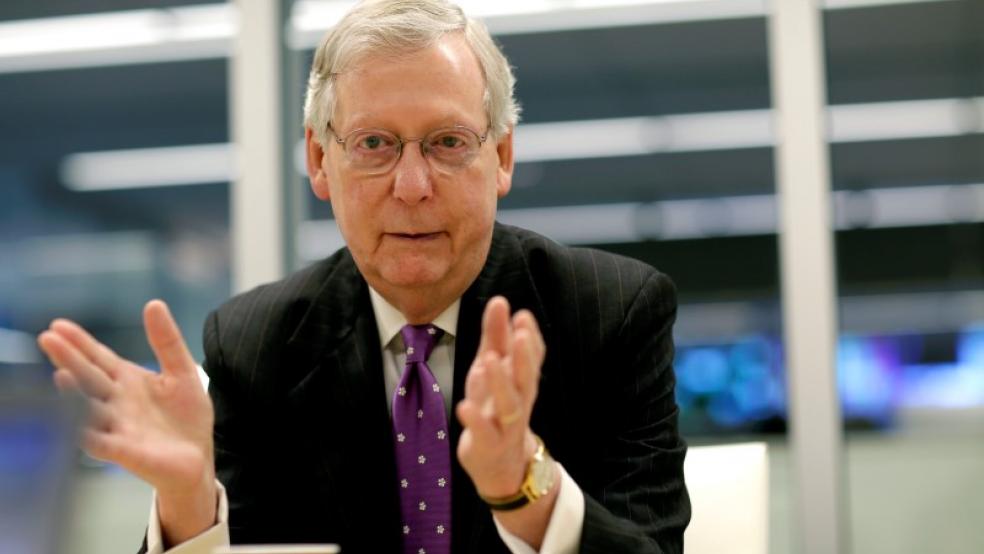It didn’t take long for Republican leadership on Capitol Hill to produce an answer to seven years of pledges to repeal Obamacare. It also didn’t take long for Donald Trump to throw his considerable political weight behind it as an answer to his promise to protect Americans through the process. It might take a long time to sort out whether the American Health Care Act (AHCA) actually fulfills either of those promises, or whether conservatives have enough patience and trust to see whether the AHCA is just the start of a longer process to fully uproot the Affordable Care Act (ACA).
So far, the reviews of the AHCA on the Right have been somewhat short of enthusiastic. In fact, four influential conservative and libertarian groups announced their opposition to the AHCA: the Heritage Foundation, Americans for Prosperity, FreedomWorks, and the Club For Growth all recommend that House Republicans vote no on AHCA and force leadership to start over.
Related: 3 Big Winners in the GOP Health Care Plan – and 3 Big Losers
“Rather than accept the flawed premises of Obamacare,” Heritage announced, “congressional Republicans should fully repeal the failed law and begin a genuine effort to deliver on longstanding campaign promises that create a free market health care system that empowers patients and doctors.”
The bill didn’t get a much more favorable assessment from the Republican Study Committee (RSC), an influential policy group within the House Republican caucus. In a memo distributed on Monday after the plan was released, the committee included tax credits among its “major concerns,” concluding that the AHCA “is, in principle, Obamacare” for its tax-credit subsidies for purchasing health insurance. The replacement for the ACA still “is fundamentally grounded on the idea that the federal government should fund insurance purchases.” Furthermore, the tax credits threaten to add up to dramatic costs, making the AHCA “a Republican plan that deficit spends at the same rate as the current plan.”
The decision to keep the controversial Medicaid expansion in place drew even more ire from the RSC, criticism that was echoed among House conservatives. The bill plans to keep the Obamacare expansion with its 90 percent federal share of payment in place for three years, and then to phase it out over the next five years at the normal 57 percent reimbursement from Washington.
That assumes that a future Congress would have the political will to maintain that phase-out, which the RSC called “doubtful” for the same reasons that Republican leadership avoided phasing it out immediately. “The major cause for the delay is to avoid the political consequences and pain of unwinding expansion, especially in Republican-held states with upcoming gubernatorial contests,” their analysis accuses, adding that “it is unlikely that any future Congress will have a stronger political will in terms of reforming Obamacare than the sitting Congress[.]”
Related: Obamacare Repeal Won’t Be Cheap: GOP Plan Could Cost $700 Billion
In so many words, the RSC accused Republicans and the Trump White House of surrendering on Obamacare repeal. But have they surrendered, or merely taken the first steps through a labyrinth of obstacles?
One challenge facing Republican leadership is the reconciliation process in the Senate. Harry Reid famously used that budgetary exception to pass Obamacare on a majority vote, eliminating the use of the filibuster. However, only legislation with a specific impact on the federal budget can cite reconciliation to avoid the filibuster. That limits what the repeal bill can do and still be passed on a majority vote. The AHCA necessarily only addresses those portions which qualify under Senate rules.
The next complicating factor is Donald Trump’s promise to ensure that Americans don’t get abandoned in the process. That’s almost certainly why the AHCA does not eliminate the Medicaid expansion immediately, as House conservatives had hoped, and why this plan continues the practice of subsidies for health-insurance purchases. The need to extend both of those for the next few years stems from the difficulty of getting a full replacement program through the Senate; Republicans clearly hope to have a filibuster-proof majority after the 2018 midterms, but need to leave some measures in place before then.
Related: A Test for the Dealmaker: Selling the Controversial GOP Health Care Plan
That doesn’t necessarily make the AHCA the best bill that can pass under these circumstances, but it does explain why Republican leadership may have refrained from producing a final, full-scale repeal-and-replace bill in favor of a transition plan. And the White House has responded to criticism of the plan by offering to negotiate amendments through the legislative process. Tom Price, former chair of the RSC and now Secretary of Health and Human Services, made that explicit on Tuesday.
“This is a work in progress,” Price told The New York Times’ Glenn Thrush, adding that they plan to work through the “legislative process.” Likewise, Trump later tweeted that the bill was “out for review and negotiation,” even while warning Republicans on Capitol Hill in a private meeting that the GOP will face an electoral “bloodbath” if they don’t take some action to roll back Obamacare soon.
So far, Trump’s sales pitch has not produced too much success, but it’s still early in the process. To get conservatives and moderates on board, Trump and the rest of the Republican leadership will need to commit to a free-market end solution when they have more political weight to replace the rest of the ACA while pointing to these efforts as just a transitional effort that protects voters in the meantime. If this really does represent the end game of the Obamacare repeal and replace effort, though, then not even Trump’s Art of the Deal prowess can salvage this sale.






